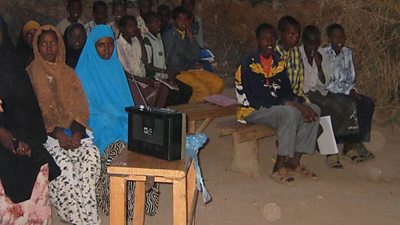Now when I get a letter from my friends or family, I can read it - previously I had to ask someone to read it for me.
According to research in 2006, at least 250,000 Somalis were reached by the radio programmes. Approximately 30,000 youths and adults – with no access to formal education – graduated from the radio classes. In a country driven by conflict, this is a huge achievement for every individual graduate.
Learning through listening
During the project's first stage, 50 radio programmes were broadcast on the ����ý Somali Service to teach reading, writing and numeracy skills.
Each episode was 30 minutes long. These taught basic literacy whilst focusing on topics relevant to listeners' lives, such as family health and nutrition, the environment and peace-building.
The programmes were supplemented with face-to-face classes run by volunteer teachers. These volunteers were literate people from the communities themselves. Radio was used to give training to be used alongside printed materials.
Classes would gather on a weekly basis to listen to the programme together and then work through the accompanying lesson in their books.
The engaging content of the programmes ensured a consistent level of quality, and also encouraged learners and tutors to meet regularly over the full year of the course.
These first programmes covered level one and two of a Somali literacy curriculum. Another series created a more advanced third level for those who wanted to improve still further.
Reaching the forgotten
The programmes sought specifically to reach people denied a conventional education. This included women and girls, disabled people, nomads and people forced to flee their homes because of conflict.
The classes worked particularly well for those now beyond school age, such as Mahamed, a 25 year-old man from Berbera, Somaliland.
"They're good because there are no young people in the class to make fun of me. I used to be very shy, thinking 'I can't sit next to a young child in class when I am this old'," says Mahamed.
Private affairs kept private
The project had a profound effect on individuals' quality of life, including privacy.
Another learner, also called Mahamed, but from Burao, Somaliland says he is now able to read and write his own correspondence.
"Now when I get a letter from my friends or family, I can read it," he said. Previously, I had to ask someone to read it for me. Now when I want to send a letter I can say anything. No-one knows but me. Before, the person who wrote the letter would tell everyone and every neighbour would know my private things, but I didn't have any choice."
Flexible learning
Some tutors were able to record the weekly radio broadcasts. This meant that classes could be run at times that were convenient for the students.
This was particularly important for the participation of women and girls, who are often expected to do household chores during conventional school hours.
Incomparable reach
����ý Media Action made the radio programmes as part of a wider educational initiative led by AET. AET operates in regions of Africa where there are either no formal structures for education or where infrastructure has broken down due to conflict. It is funded by a variety of organisations, including the European Union and Comic Relief.
Thanks to its partnership with the ����ý Somali Service, ����ý Media Action had unique access to audiences across divided Somalia, reaching nine out of ten adult Somalis via radio.
Project information
| Project name | Literacy for Advocacy, Rights & Skills |
| Funder | AET |
| Dates | 2008-2011 |
| Themes | Resilience - Livelihoods |
